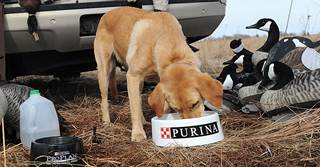Finishing Strong
Make sure your retriever is healthy and in top condition during the final weeks of the season
Make sure your retriever is healthy and in top condition during the final weeks of the season

When we reach the home stretch of a long hunting season, we need our retrievers to be at their best. All too often, however, they are somewhat worse for wear, and their performance begins to erode. What steps can we take to make sure our dogs finish the season strong?
One thing we can do is pay close attention to our dogs diet. Dr. Arleigh Reynolds of Nestl Purina PetCare is one of the worlds foremost authorities on the nutritional requirements of canine athletes. He says the most common mistake made by retriever owners late in the season is allowing their dogs body condition to deteriorate. Very simply, they grow too thin. As a result, theyre physically depleted and incapable of performing at a high level.
Ive seen it time and time again, Reynolds says. You work hard all year training your dog, you have him perfectly set up, youre hunting a bunch and having a great season, and all of a sudden he seems to run out of gas.
Many dog owners fall into a rut of feeding a fixed amount, and they dont compensate for the increased caloric demands of hunting in cold weather. Because it happens so gradually, Reynolds explains, its really easy for dogs to get thinner than they should be without you noticing. He recommends that you get in the habit of putting your hands on your dog and literally feeling his body condition. You need to run your hands over the top of the dogs back, feeling the ribs, the vertebrae, the wings of the pelvis, and so on. If they become prominent to the touch, you need to increase the amount you feed.

The caloric demands of hunting mean you might have to increase your dogs feed or add supplemental fat to his diet.
Photo Jim Thompson
Some dogs are hard to keep at a desirable weight no matter how well theyre fed. If your dog fits this profile, Reynolds suggests adding a small amount of supplemental fat. You can safely add up to 15 percent of your dogs daily caloric intake in fat without throwing his diet out of balance, Reynolds explains. You want to do it gradually, though, so as not to cause any stomach problems. Corn oil, which has about 135 calories per tablespoon, works well for this.
Supplements that you can give your dog while hunting are beneficial as well. Muscle shivering burns up a tremendous amount of glycogen, which is an important source of energy, Reynolds says. The best ingredient for replacing glycogen is maltodextrin. You can mix up your own maltodextrin supplements, but an easier alternative is to use a product like GU, an energy gel for human endurance athletes thats widely available. One packet is about 100 calories, so for a Lab-sized dog one or two packets during the hunt and another one or two at the end of the day should be enough to keep him going strong. If you do use GU or similar supplements, be sure to choose products that are caffeine-free. Even small amounts of caffeine can have adverse health effects on dogs.
Another critical factor in the late-season equation is an increased risk of injury. Wisconsin veterinarian Dr. Terry Barker says, Because everything in the environment is drier and stiffer late in the season, thats when we typically see a large number of penetrating wounds. Any time you find a stick or other object thats broken off anywhere in your dogs body, you need to leave it in place and get your dog to a veterinarian as soon as possible. You dont know how long the foreign object is or how deep it goes, so you should never try to remove it yourself, Barker advises. Its always something a veterinarian needs to assess. An insulated vest affords great protection against penetrating injuries while at the same time helping to maintain body warmth.
As ice, snow, and frozen ground increasingly become the order of the day, the incidence of injuries associated with sudden loss of footing (such as twisting or slipping) and repetitive pounding rises. The toes, carpal joints, hip flexors, and spinal column are especially vulnerable, but none of the dogs running gear is immune. Late-season dogs should be in the best shape of the year, Barker says. So if theyre not displaying their usual drive and stamina, you want to examine them closely for some kind of nagging injury.
Ducks Unlimited uses cookies to enhance your browsing experience, optimize site functionality, analyze traffic, and deliver personalized advertising through third parties. By continuing to use this site, you agree to our use of cookies. View Privacy Policy